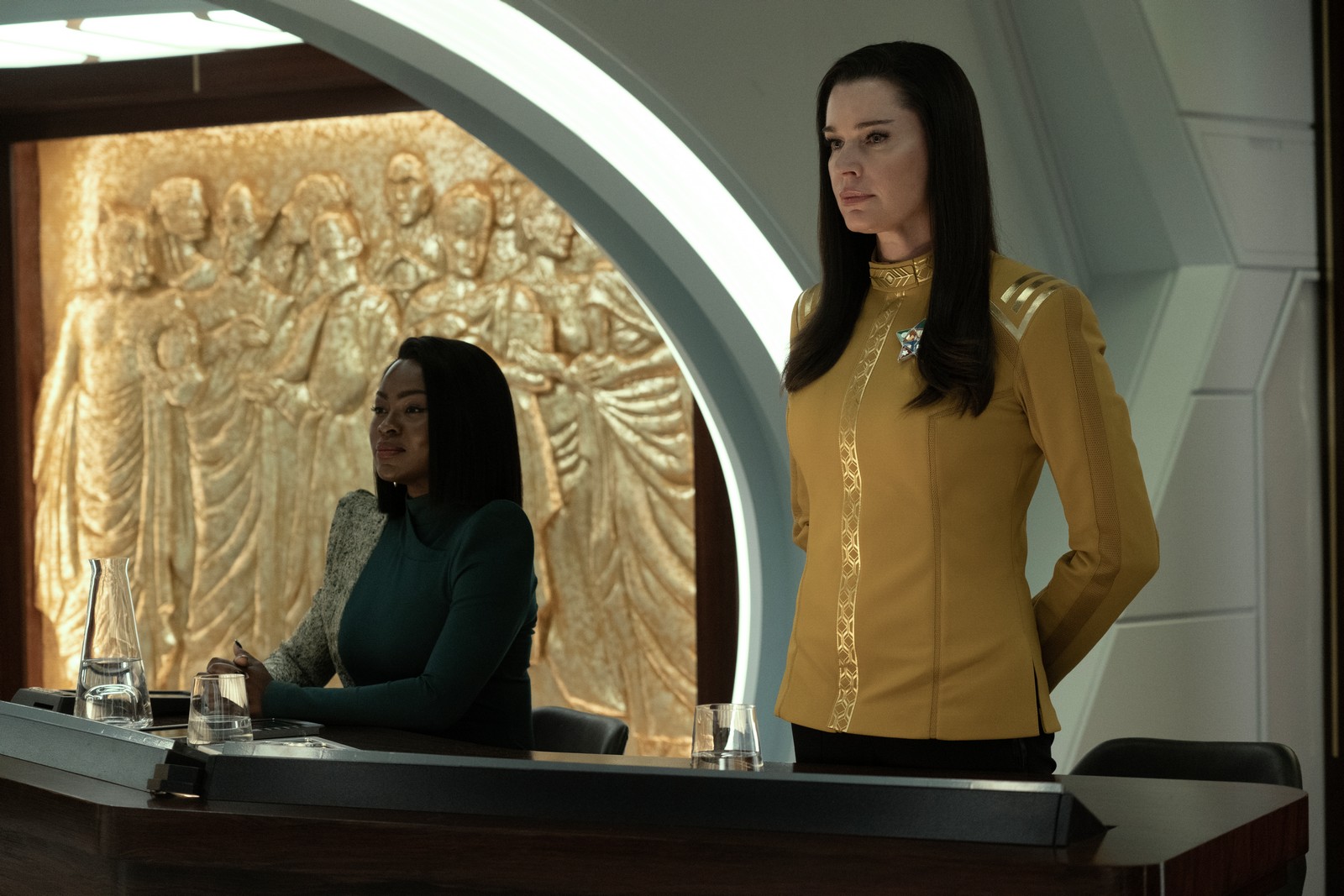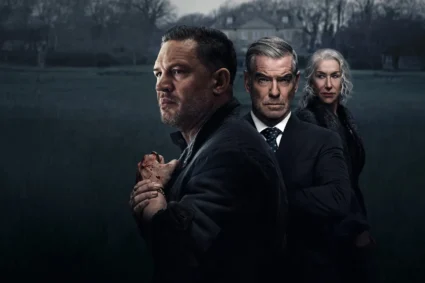
Yetide Badaki as Neera and Rebecca Romijn as Una (Paramount+)
Here’s the episode wherein we learn the fate of Una Chin-Riley, aka “Number One”. To say this a heart-wrenching episode is an understatement – even a Tellurite would agree. This episode goes back to one of the hallmarks of Star Trek – Peoples’ Rights, and if a law is unjust should it be a law? If a law enshrines racism or draconian discrimination against an entire species, for no reason beyond fear, should it not be challenged, especially when said fear is not necessarily warranted?
Captain Pike’s resolve and determination to have his first officer exonerated and reinstated opens the episode in dramatic fashion. How many of us would risk our own lives (literally) as he does going to Una’s home planet, a divided world with extreme hardship for the genetically modified Illyrians, where he cannot breathe the environment? The man literally is willing to allow himself to suffocate to death to make contact with a people’s rights lawyer who refuses to see him. Thankfully for all involved, his stubbornness pays off since its obvious by the end the Illyrians have been suffocated as a people.
This episode is strongly reminiscent of such Trek episodes as The Measure of a Man, where Data faces a tribunal to decide if he is a sentient being, or Dr Bashir, I Presume, where Bashir’s genetic modifications are exposed, which carries a prison sentence. All three are a product or victim of the choices, traditions, or wants of others. Data was constructed by Dr Soong, Una’s species does modification as both tradition and a way to survive brutal environments, and Dr Bashir’s parents made a choice to correct what was implied to be cognitive and developmental issues. In all three cases all are exemplary officers who go above and beyond, and ask for no special treatment, nor flaunt their abilities. Bashir and Una however have to hide who they are out of fear for their safety and wellbeing, though they have committed no crime.
The loyalty of the crew, both as colleagues who depend on each other every day, and genuine respect and affection on a personal level is heavily tested. We see how La’an looks up to Una as her mentor, the person who saved her from brutal death as a child by the merciless, parasitic Gorn. Yet we also see guilt in her when she reveals she might have betrayed Una in anger. How Spock and Una forged mutual respect for each other when he first began serving under Pike, and yet his extreme discomfort under questioning by a fellow Vulcan is obvious. Uhura is in conflict wanting to help La’an investigate but refusing an illegal order, not an easy moment for a junior officer who last season wasn’t even confident in herself. Admiral April who testifies Una is an extremely “talented officer” and an asset to the fleet, yet admits he would have followed rules and not sponsored her had he known. Like all admirals he had no problem bending General Order One, the so-called Prime Directive when he felt the situation warranted it, but fails to see the hypocrisy.
There is also the lawyer who defends Una. While one would like to feel she was doing so with vigour because it was her job, we see her extreme animosity towards the Federation and Starfleet, and her disgust is never far from the surface. It becomes apparent that for her this is also her soapbox from which to make her case, not dissimilar to political activists in our time and our history. However, one could argue that her intense passion is what makes her eventually successful defence of Una even more plausible, born of her own suffering and hardships as an Illyrian fighting for justice for all Illyrians.
It would not be incorrect to feel anger and disgust at hearing of the brutal regime and discrimination against modified Illyrians. The forcing of them into inhumane conditions in a separate city, the violent attacks, the loss of access to basic needs like medical care, where even a simple broken bone can result in death, and the denial of opportunities especially to those whose modifications are more obvious are case in point. There are Illyrians who agreed to give up their practices for limited acceptance, and one could surmise this parallels events in our recent history where people of certain ethnicities became acceptable only if they give up everything bending to those who have dominion over them, yet never receiving all the same rights and privileges. One could even draw parallels to the various forms of apartheid here on Earth, the banishing to ghettoes, or various brutal dictatorial regimes based in fear, a false sense of moral superiority, and extreme bigotry over people who have no control over the circumstances of their own births.
Overall, this episode does what Star Trek does best – telling the stories of people. The Prime Directive being challenged, the rights of minorities and people who are different, the loyalties of the crew being challenged, and an ugly side of paradise being exposed. The ongoing pebble in the pond ripples from the Eugenics Wars and the fallout from the genetic modifications of humans still affecting the Federation’s policies. This ruling no doubt later helped Bashir’s case, another modified fleet officer uncovered and facing permanent judgement and ban. The testimony of the crew is well done, with most of the heavy lifting being Una and La’an. The slavish devotion of some to discriminatory laws is subtle as a brick to the head, while the eventual verdict shows a small step forward, and is perhaps the most realistic ending of all. Why? Because a sweeping victory and overturning of such laws might make a happier ending, but even now laws are slow to evolve and change and progress can be painfully slow for some and too quick for others.
Final Grade: A


